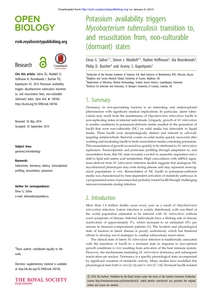Salina, EG; Waddell, SJ; Hoffmann, N; Rosenkrands, I; Butcher, PD; Kaprelyants, AS
(2014)
Potassium availability triggers Mycobacterium tuberculosis transition to, and resuscitation from, non-culturable (dormant) states.
Open Biology, 4 (10).
ISSN 2046-2441
https://doi.org/10.1098/rsob.140106
SGUL Authors: Butcher, Philip David Waddell, Simon John
![[img]](https://openaccess.sgul.ac.uk/107293/1.hassmallThumbnailVersion/Potassium_availability_triggers_Mycobacterium.pdf)  Preview |
|
["document_typename_application/pdf; charset=binary" not defined]
Published Version
Download (1MB)
| Preview
|
Abstract
Dormancy in non-sporulating bacteria is an interesting and underexplored phenomenon with significant medical implications. In particular, latent tuberculosis may result from the maintenance of Mycobacterium tuberculosis bacilli in non-replicating states in infected individuals. Uniquely, growth of M. tuberculosis in aerobic conditions in potassium-deficient media resulted in the generation of bacilli that were non-culturable (NC) on solid media but detectable in liquid media. These bacilli were morphologically distinct and tolerant to cell-wall-targeting antimicrobials. Bacterial counts on solid media quickly recovered after washing and incubating bacilli in fresh resuscitation media containing potassium. This resuscitation of growth occurred too quickly to be attributed to M. tuberculosis replication. Transcriptomic and proteomic profiling through adaptation to, and resuscitation from, this NC state revealed a switch to anaerobic respiration and a shift to lipid and amino acid metabolism. High concordance with mRNA signatures derived from M. tuberculosis infection models suggests that analogous NC mycobacterial phenotypes may exist during disease and may represent unrecognized populations in vivo. Resuscitation of NC bacilli in potassium-sufficient media was characterized by time-dependent activation of metabolic pathways in a programmed series of processes that probably transit bacilli through challenging microenvironments during infection.
Statistics
Item downloaded times since 20 Jan 2015.
Actions (login required)
 |
Edit Item |



